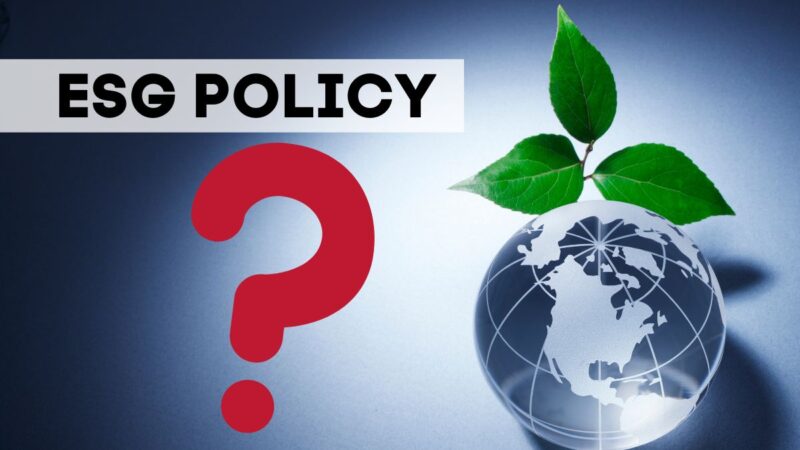What is the UK government doing about ESG?
The United Kingdom government has been actively promoting Environmental, Social, and Governance (ESG) practices through various initiatives and policies. Some key actions taken by the UK government are:
Legislation and Reporting Requirements: The UK government has introduced legislation to encourage ESG reporting and transparency. The Companies (Miscellaneous Reporting) Regulations 2018 requires large companies to disclose information on their social and environmental impact, including their greenhouse gas emissions, diversity policies, and employee engagement.
Additionally, the Financial Reporting Council (FRC) has issued the UK Corporate Governance Code, which emphasizes the importance of ESG factors in board decision-making and reporting.
Green Finance Strategy: The UK government launched the Green Finance Strategy in 2019, which aims to mobilize private capital towards green and sustainable investments. The strategy includes initiatives such as issuing green bonds, establishing the Green Finance Institute to drive innovation and collaboration, and requiring listed companies to disclose climate-related financial information in line with the Task Force on Climate-related Financial Disclosures (TCFD) recommendations.
Net Zero Commitment: The UK government has set ambitious climate targets, including the commitment to achieve net-zero greenhouse gas emissions by 2050. To support this goal, the government has implemented policies such as phasing out unabated coal power generation, promoting renewable energy sources, and investing in low-carbon technologies. These measures encourage companies to align their strategies with the transition to a low-carbon economy.
Green Industrial Strategy: The UK government has launched a Green Industrial Strategy, which focuses on sustainable economic growth and job creation. The strategy promotes investment in clean technologies, supports the development of green industries, and encourages innovation in areas such as renewable energy, electric vehicles, and energy-efficient infrastructure. By fostering a green economy, the government aims to create new opportunities while addressing environmental challenges.
Green Procurement: The UK government has implemented policies to integrate ESG considerations into public procurement processes. It encourages the use of sustainable products and services and provides guidance to public sector organizations on how to consider environmental and social factors when making procurement decisions. These measures promote responsible and sustainable business practices while driving market demand for ESG-focused products and services.
Stewardship Code: The UK government has revised the Stewardship Code, which sets out principles for institutional investors to engage with companies on ESG issues. The updated code emphasizes the importance of active stewardship, long-term value creation, and the integration of ESG factors into investment decisions. It encourages investors to consider the sustainability practices of companies and hold them accountable for their ESG performance.
The Global picture
Governments around the world have recognized the significance of Environmental, Social, and Governance (ESG) factors and are taking various actions to promote and regulate ESG practices. Some examples of what governments are doing:
Financial Incentives: Governments are implementing financial incentives to promote sustainable practices. This includes tax incentives and subsidies for companies that invest in renewable energy, energy-efficient technologies, and sustainable infrastructure projects. By providing financial benefits, governments encourage businesses to adopt ESG measures and accelerate the transition to a low-carbon economy.
Stakeholder Engagement: Governments are engaging with various stakeholders, including businesses, investors, and civil society organizations, to develop ESG policies and frameworks. They are collaborating with industry leaders and experts to set standards, promote best practices, and establish guidelines for measuring and reporting ESG performance. Governments also conduct consultations and seek public input to ensure that these policies reflect the needs and concerns of society.
Partnerships and International Cooperation: Governments are forming partnerships and participating in international initiatives to address global sustainability challenges. They collaborate with other countries, organizations, and multilateral institutions to share best practices, exchange knowledge, and develop common frameworks for ESG integration.
Examples include the United Nations Sustainable Development Goals (SDGs) and the Paris Agreement on climate change, where governments commit to collective action on environmental and social issues.
New analysis shows Late payments are damaging small businesses like Inventory Providers – but there are solutions
Sian Metcalfe Operations Director at Inventory Base who is known by many in the propery Lettings and property industry as an extremely caring and knowledable figure, gives her insight into a problem that is affecting more and more businesses, cashflow or lack of it. Focusing on the plight of inventory providers in the lettings vertical.
‘It is easy to think that clients paying late is something that all small companies and inventory providers are used to or even accept. Few people realise that being paid on time is the biggest factor in the success or otherwise of small businesses.
Statistically, more small businesses fail due to the late or non-payment of invoices than any other factor. In fact, SMEs are being paralysed by late payments, so what is the Government doing to tackle the inequality and how do you handle late-paying clients?
An article by The Credit Protection Association found that more than half of all of the country’s smaller businesses suffered from late-paying clients, and are owed a collective £17.5 billion in late payments. This has been exacerbated by the downturn in the growth of the economy.
This is resulting in more than 50,000 small businesses failing every year due to having insufficient cash as the result of late-paying clients; sadly, many of these businesses are less than 12 months old. Profitability is essential for long-term success, but cash is king.
Positive cashflow keeps small businesses alive – a few late payments, especially from large clients, can quickly push a business into insolvency.
It is not only about surviving the cashflow challenge; in addition, chasing late-paying clients eats up valuable time – up to two hours a day in some cases – and resources taking the focus away from securing more reports, more business as well as meeting clients’ expectations in terms of delivery and service.
For the owner of a small inventory business, it is often impossible to separate the business’s finances from personal finances; therefore, if the business is cash-strapped, so is the owner.
Inventory providers
By the very nature and size of most inventory businesses, often sole traders or self employed, with limited access to support or sources of funding, cash reserves are usually very restricted and it becomes a struggle to pay the bills once a client delays payment.
The is especially relevant if the agent or landlord are waiting on funds themselves from the collection of rent or management fees.
Many inventory professionals work with corporate or high street lettings agents who often have a 90 day payment policy and so what appears to be an insignificant amount to such bodies and organisations can have a hugely detrimental affect on the inventory clerks ability to provide services.
Late-paying clients can even make it is impossible to pay sub contractors, employees or their own liabilities. It is no wonder late payments and late-paying clients are such an emotive issue. Mental Health is being affected by late payments
Chasing late-paying clients is often the most stressful part of owning a business; in fact, in some cases, it can lead to mental health issues.
SME owners and inventory providers can suffer from insomnia, stress, anger and/or depression as a result of the impact of late payment on their cash flow. In severe cases, these issues are known to have caused owners to contemplate or even commit suicide.
According to research by Pay.uk the late payment culture is having a huge negative impact on British business:
88% of the smallest businesses worry about late payment
66% of owners found their work less enjoyable because of late payments
25% said that late payments affect their lives outside of work
9% have considered seeking professional help due to the stress of late payments
In an article by Donut – digital payment platform Juno conducted a survey that has found that;
63% of small businesses are saying they are suffering from stress, anxiety, depression as a result of cash flow issues caused by late-paying clients.
91% of those businesses in the communications sector (sales, media, marketing, PR and advertising) are paid late compared to 68% of all UK businesses. Legal businesses (81%), construction (72%), education (73%) and hospitality and leisure (55%). Retail is the least affected sector but still has almost half of firms being paid late (44%).
With over five million self-employed people in the UK (and growing), this is not a small problem and is often compounded by the fact that over half of small business owners turn to family and friends or personal savings for financial support due to the late payment of invoices.
What can be done to alleviate the headache of late-paying clients?
Surprisingly, despite the stress, many inventory providers and business owners back down from collecting monies owed because they cannot deal with the awkward conversations associated with asking for payment.
It’s definitely a skill to manage late-paying clients and debt collection but it can be mastered alongside the role of a clerk and business owner.
These conversations can be avoided by having a clear process that ensures your invoices are paid on time – or as near as possible – without damaging the client relationship.
Using online tools can have a big impact; for example, before engaging with a new client check their credit worthiness via services such as Experian who provide an online credit checking service so you find out who is well-financed and how good they are at paying their bills.
In the property rental sector, there are some really good property management software tools for invoicing and credit control that record all the key information to ensure chasing invoices is as painless as possible. Inventory Base integrates with Xero, Clearbooks and Quickbooks to help manage your invoicing needs.
But even with the best software at your fingertips, you should always discuss with potential clients your terms and conditions at the very start of your business relationship and ensure that you:
Set expectations – from the beginning of the contract or your work with the client, clearly define terms of payment and include charges or penalties for late payment.
If payments are late or are starting to show a pattern of lateness then you should:
Talk to your client – when payment is due, speak directly with your client. Emails and letters are easy to ignore, so have a polite, friendly but assertive conversation.
Ask for a valid reason – find out whether there is a reason why the payment is late, attempt to resolve it, and try to agree on a date for payment.
Be persistent – call the client back daily until the situation is resolved.
The last thing you want is for the late payment to turn into a bad debt.
Inventory reports, checkouts and interim inspections are nearly always provided up front with invoices sent out at the end of the month with terms of 7, 14 or 30 days (depending on the length of time they have been a client).
Requesting payment on booking and before the report is complete is an option to help alleviate the issue of late-paying (Inventory Base collects payments via the invoicing facility).
If all else fails, it may sadly come down to legal action, but at least you will know that you have done everything right and are better prepared to manage the issue of late-paying clients moving forward.
What is the Government doing to help small businesses?
The Late Payment of Commercial Debts Act states that payment should be made within either 30 days when dealing with public entities or 60 days when dealing with private business.
However experience tells us this is rarely adhered to especially by larger corporate entities or even by smaller businesses who themselves are being impacted by late payments.
The government has recognised that small businesses are vital to the UK’s economic recovery following the pandemic and has announced an overhaul of the Prompt Payment Code (PPC) to crack down on late invoice payments to small businesses.
Companies and businesses of all sizes are encouraged to sign up to the code, which now requires them to pay 95% of invoices from small businesses within 30 days.
It remains to be seen how effective this measure will be, but there is no doubt that all business owners need to adopt a culture of prompt payment for everyone’s benefit.
How Inventory Base Workstreams can reduce the risk of late-paying clients
Inventory providers and business owners in the rental and lettings sector are fortunate that property management software and property inventory software has advanced significantly over the years.
Inventory Base already has a comprehensive list of features for managing the reporting process but also provides an invoicing feature to accurately invoice and manage reports to help ensure the smooth flow of cash into the reporting business.
Another option includes secure payment within Workstreams when outsourcing property related reports and services.
The Buyer (landlord, agent or other industry supplier) has to pay for the report upfront at the agreed bid price and is then held in an virtual Escrow account ready for payment to the Supplier (inventory professional) when the report is delivered.
Moving forward
Businesses and clients alike should think about the issue and impact of late payments on the inventory supplier industry each and every time an invoice is received or a payment request is made.
Customers, suppliers and others are connected by payments. A culture of paying on time not only means that businesses thrive but also has a positive impact on people’s lives and mental well-being.
If you are struggling with late payments, debt or with your mental health you can contact the following organisations and services for support, advice and guidance.
Samaritans
Phone: 116 123 (free 24-hour helpline)
Website: www.samaritans.org.uk
SANE
Website: www.sane.org.uk/support
Mind
Phone: 0300 123 3393 (Monday to Friday, 9am to 6pm)
Website: www.mind.org.uk
Citizens Advice
Website: www.citizensadvice.org.uk/debt-and-money/help-with-debt/
Proptech and Property News in association with Estate Agent Networking.
Andrew Stanton is the founder and CEO of Proptech-PR, a consultancy for Founders of Proptechs looking to grow and exit, using his influence from decades of industry experience. Separately he is a consultant to some of the biggest names in global real estate, advising on sales and acquisitions, market positioning, and operations. He is also the founder and editor of Proptech-X Proptech & Property News, where his insights, connections and detailed analysis and commentary on proptech and real estate are second to none.












